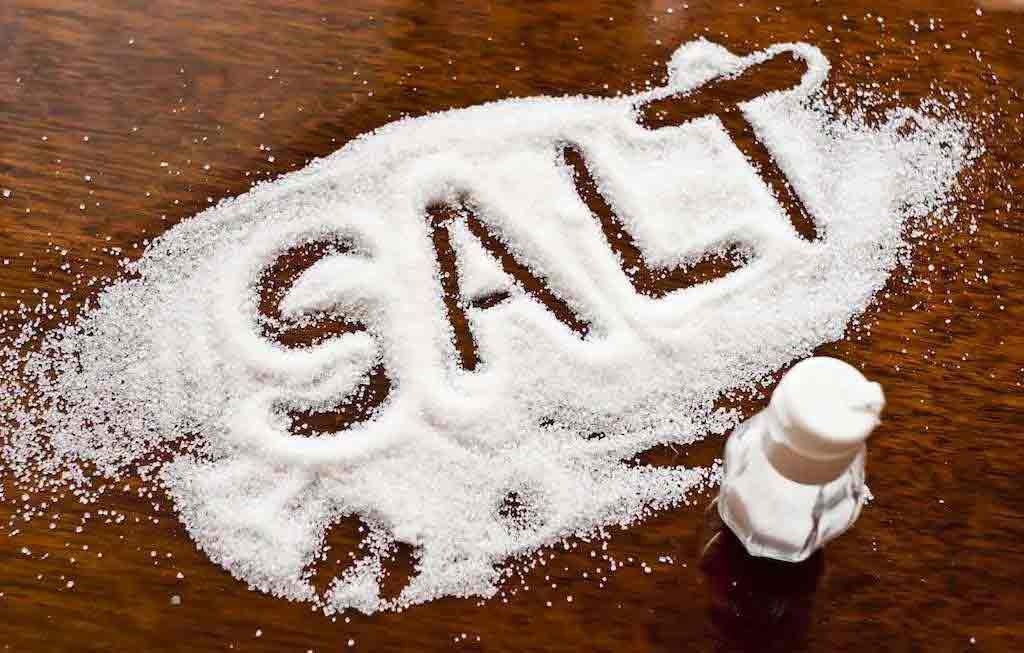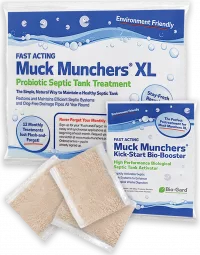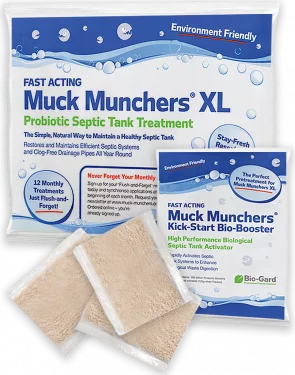Why Septic Tanks & Water Softeners are Not a Great Combination!
There is conflicting evidence about the use of septic tanks and water softeners. Generally, the industry opinion is that the backwash from water softeners harms septic tanks.

Hard water can cause all kinds of problems:
- It’s heavy on minerals
- Causes clogging
- Can affect the way your water tastes
Therefore, it’s fairly understandable that people will want to use water softeners to:
- To help remove some of the nastier minerals
- Minimise scale build-up in pipes
- Clearing out their pipes
- Cutting down on detergent and soap usage.
However, there is more than a little misinformation out there regarding septic tanks and water softeners.
The main issue lies with salt content. High salt content may change the soakaway soil structure impeding drainage. So, what should you do?
The bottom line for us here at Muck Munchers is that you should, to play safe, try and use a water softener that’s free from salt. In any case, if you’re unsure what to do with water softener discharge, or want to know more about septic tanks and water softeners, read on.
Why Are Salt-Based Water Softeners Damaging for Septic Tanks?
Septic tanks & water softeners bring problems to your soakaway and it’s all to do with salts’. If you use a water softener with a high salt content, you’re at risk of restricting the soakaway’s performance. That’s because salt can ‘bind’ with clay particles, even in sandy soils to create waterproof barriers.
This effectively means that your soakaway fills up with water only, meaning that your tank’s bacteria – the aerobic kind – start losing the air that they need.
This also means that anaerobic bacteria can build up and create slimy conditions. That means you’re at risk of blocking the soakaway even further. As you can imagine, that’s going to lead to your septic tank backing-up, and may even lead to nasty sludge conditions. All the way around, too much salt can lead to pumping out more frequently and serious damage to your soakaway.
A little salt here and there likely won’t hurt your septic tank and soakaway. However, over time, this can build up – and while Muck Munchers are formulated to withstand saline conditions, it’s a very good idea to try and keep an eye on the sodium you’re discharging into the tank.
What is a Water Softener Backwash?
This is the process through which your water softener will push through any nasty minerals so that it can take out the ‘hard’ and bring in the ‘soft’.
Regeneration is all about ‘catching’ the hard nastiness and then flushing it all out with salt water. This is sometimes known as brine, and it will then flush through in a cycle to help bring in softer H2O.
That backwash isn’t just going to filter through into the drainage and sewer systems. It’s heading right to your tank, and that’s going to mean you end up adding it to your soakaway – a big problem if you want to continue to have a good septic tank.
Hard water is a big problem for many people in the first place, so if you suffer from it – and if you have a septic tank installed – you need to be careful to keep a balance.
Luckily, there are a few different solutions you can try, and we’ll take a look at those a little further down in this article.
What is Happening During Water Softener Regeneration?
In a salt-based water softeners, the whole water softening process relies on untreated water passing through a resin chamber. Normally, sodium positive ions coat the resin. As water flows over this resin, naturally occurring calcium and magnesium positive ions ‘stick’ to the resin.
Sodium ions are released into the water to maintain a balance of electrical charge on the resin. Gradually, most of the sodium ions are released into the water, and the resin now becomes saturated with calcium and magnesium ions.
Every few days the unit must regenerate itself, by recharging the resin. It rinses itself with a concentrated solution of saltwater (sodium chloride). High concentrations of sodium ions in the salty water displace the calcium and magnesium ions in the resin and that resin again is now covered with sodium ions. The salty rinse water, the backwash, is flushed into whatever drainage system the property has.
Do Septic Tank Manufacturers Recommend Water Softeners?
On the whole, septic tank manufacturers don’t recommend you push anything through into your septic system that is likely to kill-off or reduce its performance. On top of this, if you have a soakaway / drain field setup, which is the case with most septic systems, you’re at risk of slowing down drainage performance. Septic tank providers will generally suggest that you do all you can to keep your bacteria levels healthy.
Remember that it is aerobic bacteria you need to thrive so that you can keep breaking down those solids and all that sludge. However, if your soakaway blocks up, you’re at risk of driving down that bacterial community.
Remember that it is aerobic bacteria that need to thrive so that you keep breaking down organic waste and sludge. However, if your soakaway blocks up, you’re at risk of damaging that bacterial community.
The aim of avoiding salt softeners is to ensure that you don’t have to keep pumping out your septic tank. Yes, it makes sense to soften your water if you are struggling with hard water conditions. What’s more, there are occasions when you will need to pump out your septic tank, though these should be few and far between, and certainly not every few months.
What are the Alternatives to Salt-based Water Softeners?
If you really want to keep your septic tank running smoothly for the years to come, you to need to look for alternative water softener discharge options or salt-free water softeners.
In truth, these systems are technically descalers rather than water softeners. They do not change the chemical balance of the water and are designed to either prevent limescale forming or stop it from adhering to pipe surfaces and the inside of your appliances.
Electronic and Electromagnetic Water Treatment Systems
These units are generally mains electricity operated and benefit from being relatively inexpensive as well as compact. With these Electronic Systems no changes to plumbing is required – they are easy to install an can be fitted to both metal and plastic pipes.
Inline Electrolytic or Magnetic Scale Reducers
An alternative to electrically operated stems is to install a scale reducer. Although they need to be plumbed in, the major benefits are that they require no electricity and very inexpensive to buy and readily available at plumbing suppliers.
In Summary
At Muck Munchers, we’re not in a position to advise you on which softeners are likely to work best for your own septic tank and water supplies.
If you are not sure if salt will cause major issues for you and your soakaway, then it makes perfect sense to sway towards a non-saline option to help cut down on blockages – the last thing you want is a soakaway that’s just not working efficiently.
Muck Munchers provide biological bacterial support for septic tanks and systems of all shapes and sizes. Unfortunately, salt-based water softening can cause a lot of problems for septic tanks and sewage treatment plants. Therefore, while we offer some of the hardiest microbes you’ll ever come across, it is definitely worth looking into non-salt alternatives.
Hard water is a problem that no one wants. Beyond this, if you are already balancing things with a septic tank, you are at risk of causing a bit of a perfect storm – that salt is just going to cost you more money and maintenance woes in the long run.
Check out the various alternative water softener discharge options and grab some Muck Munchers to help keep your septic tank working. If you’d like to know more about how septic tank bacteria work for you, check out our other guides and resources!










